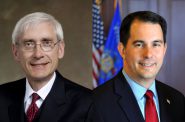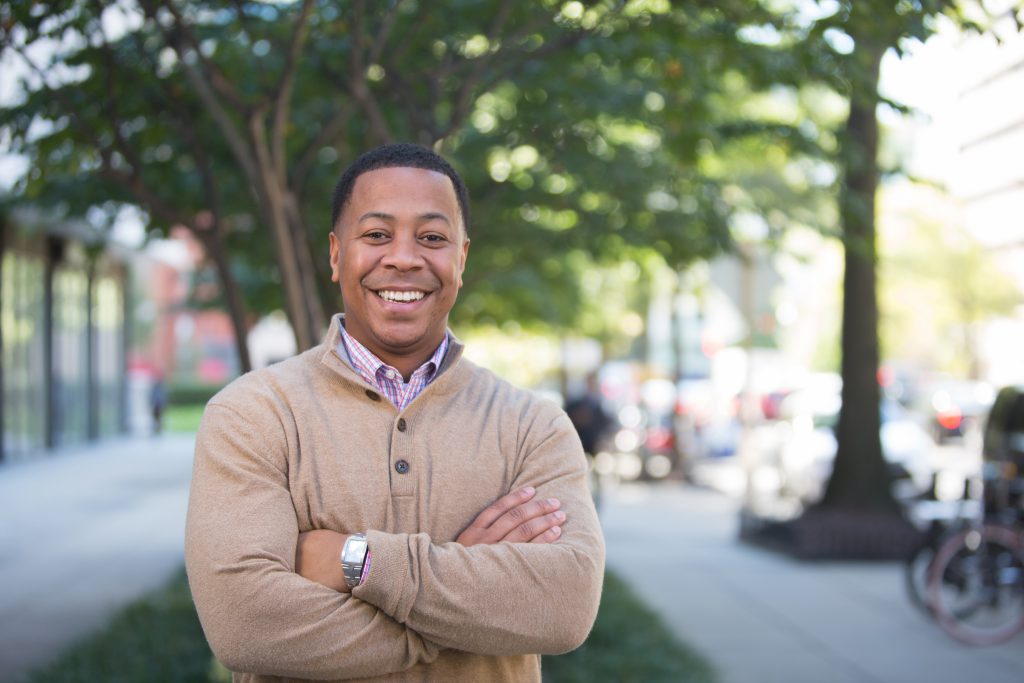Act 10 Protests Ignited Mahlon Mitchell’s Political Career
Madison firefighter hopes to harness union power to oust Walker.
Wisconsin firefighters chose Mahlon Mitchell to lead their statewide union in 2010, the same year voters elected Scott Walker to be Wisconsin’s governor.
Mitchell, who was 33 then, said he didn’t have much experience with public speaking at the time, but that was about to change.
In 2011, when Walker introduced the bill now known as Act 10 that restricted the bargaining rights of most public sector unions, thousands, and then tens of thousands of protesters flooded the state Capitol grounds.
Firefighters were exempt from most of Act 10, and Mitchell’s union initially praised Walker.
But about a week into the standoff, they broke from Walker and joined the protests. Firefighters like Mitchell became the faces of union solidarity.
Mitchell said he wrote his first speech on the back of a bar napkin. The “house of labor” was on fire, he told the crowd, and the firefighters were there to put it out.
“We’re going to make sure there’s no doubt tonight because the firefighters are going to sleep in the Capitol tonight,” Mitchell said on Feb. 21, 2011. The massive crowd of union members and their supporters erupted.
The 2011 protests aren’t Mitchell’s only connection to Walker. They both grew up in Delavan and graduated from Delavan-Darien High School about a decade apart.
Longtime friend Kevin Hembrook has known Mitchell since sixth grade. He said some of his best times in high school were getting lunch with Mitchell every day.
“If you can find somebody that didn’t like Mahlon Mitchell in that class, good luck,” Hembrook said. “I’m pretty sure that he was well-liked by everybody.”
A few years after high school, Hembrook followed Mitchell to Madison to become a firefighter himself. Hembrook remembers watching his longtime friend speak at the 2011 rallies.
“I’m getting goosebumps just thinking about it again,” Hembrook said in a recent interview. “Because of the way he would speak and the praise that he would get from the crowd.”
Mitchell said he didn’t grow up in a union household, and after high school, he started culinary school in Chicago. But he said he knew it wasn’t for him.
“I hated culinary school,” Mitchell said.
Mitchell’s older brother had become a firefighter and raved about the camaraderie of the job. Mahlon Mitchell was sold. He said he went to culinary school in the morning, worked a retail job during the day, then took firefighting classes at a local tech school by night.
Mitchell became a firefighter in 1997, but he said he got more involved in the union after a fellow Madison firefighter, Casey Carlin, was paralyzed in an off-duty snowmobile crash in 2003. The union raised money for Carlin and stayed active in his life until he died more than a decade later.
“That’s the catalyst that made me want to get in the union,” Mitchell said. “I said I want to be part of that, part of something that’s basically bigger than yourself.”
Mitchell has endorsements from the Wisconsin AFL-CIO, AFSCME Wisconsin, and the International Union of Operating Engineers Local 139, a road-building union that endorsed Walker in his 2010 campaign for governor.
But Wisconsin unions are weaker than they were before Walker signed Act 10 and later right-to-work for private sector unions.
James Feigenbaum is an assistant professor of economics at Boston University who has studied how the passage of right-to-work laws affects the power of unions to influence elections.
In short, he says the laws leave Democrats worse off with fewer rank-and-file union members to get out the vote.
“It would not surprise me at all that sort of a weakened labor movement or weakened organized labor would have a harder time sort of making their endorsements really count,” Feigenbaum said. “If there are fewer union members, then those endorsements carry with it fewer guaranteed voters or fewer guarantees for your campaign.”
Mitchell has embraced unions, but he says he’s not just the labor candidate.
He has other endorsements. While many prominent Democrats have remained neutral in the 10-candidate primary, U.S. Rep. Gwen Moore announced last November that she was supporting Mitchell.
Moore said Democrats have been too cautious choosing their candidates in previous campaigns against Walker.
“We’re always so calculating about this,” Moore said. “It’s time to just support somebody who has your heart.”
For Moore, that candidate is Mitchell.
“I need somebody who is on fire,” Moore said. “And that was a firefighter.”
Mitchell ran an unsuccessful campaign for lieutenant governor in the 2012 recall election, losing to current Lt. Gov. Rebecca Kleefisch.
“Where I got 1,156,560 votes-ish,” he tells crowds in his stump speech. “You always remember the number you lose by because you know the threshold you need to actually win.”
The recall raised Walker’s national profile and dealt a blow to unions.
Mitchell wants to return the favor in November.
Democrat Mahlon Mitchell’s Political Career Forged In Fire Of Act 10 Protests was originally published by Wisconsin Public Radio.
If you think stories like this are important, become a member of Urban Milwaukee and help support real, independent journalism. Plus you get some cool added benefits.
More about the ACT 10
- Susan Crawford Attempted to Overturn Act 10 - Brad Schimel - Feb 26th, 2025
- Despite Act 10, Union Argues UW Health Nurses Can Collectively Bargain - Rich Kremer - Feb 13th, 2025
- Protasiewicz Says She Won’t Recuse From Act 10 Case - Anya van Wagtendonk - Feb 13th, 2025
- Unions: We Remain Confident in Merits of Our Case - Wisconsin Education Association Council - Feb 12th, 2025
- Supreme Court Justice Brian Hagedorn Recuses Himself From Act 10 Challenge - Rich Kremer - Jan 31st, 2025
- Republicans Push Justice Protasiewicz to Recuse From Act 10 Case - Anya van Wagtendonk - Jan 29th, 2025
- Ruling That Struck Down Act 10 Put on Hold - Rich Kremer - Dec 20th, 2024
- Data Wonk: Did Act 10 Improve Wisconsin’s Economy? - Bruce Thompson - Dec 12th, 2024
- Op Ed: Republicans Behind the Times on Act 10 - Ruth Conniff - Dec 11th, 2024
- Murphy’s Law: Act 10 Ruling Could Be Tough to Overturn - Bruce Murphy - Dec 9th, 2024
Read more about ACT 10 here
Race for Governor
-
Last of the Republican Upstarts
 Nov 5th, 2018 by Shawn Johnson
Nov 5th, 2018 by Shawn Johnson
-
Walker, Evers Differ on Gun Laws
 Oct 30th, 2018 by Laurel White
Oct 30th, 2018 by Laurel White
-
Evers Questions Foxconn Air Quality
 Oct 29th, 2018 by Sarah Whites-Koditschek
Oct 29th, 2018 by Sarah Whites-Koditschek






















So would he reverse ACT 10? Wow, thanks for the fluff pieces these are truly worthless.